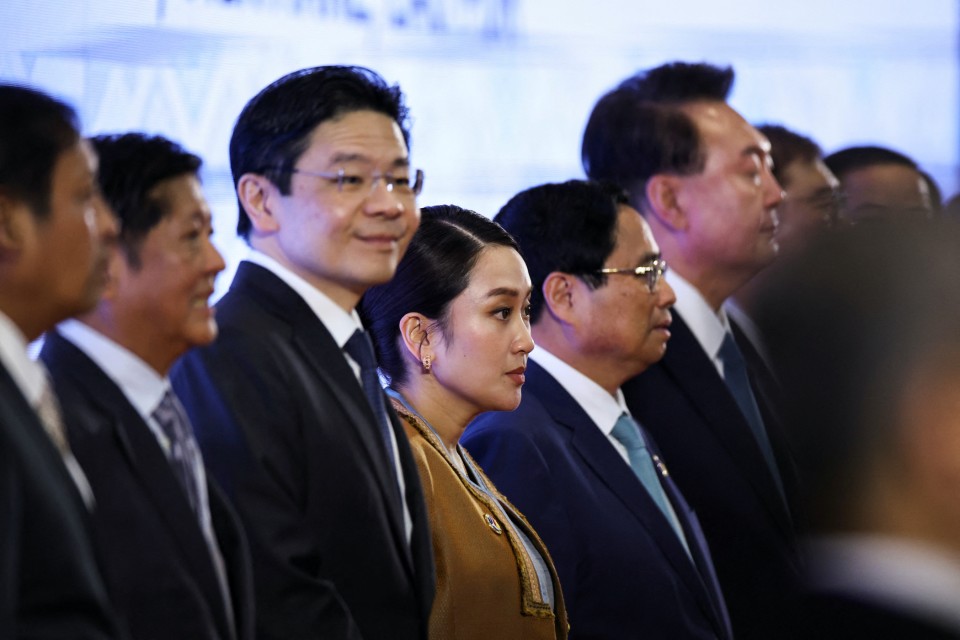
By Panu Wongcha-um
VIENTIANE, Laos (Reuters) -Philippine President Ferdinand Marcos Jr pressed Southeast Asian leaders and China at a regional summit on Thursday to urgently speed up negotiations on a code of conduct for the South China Sea, while accusing Beijing of harassment and intimidation.
Speaking in Laos to leaders of the Association of Southeast Asian Nations (ASEAN) and Chinese Premier Li Qiang, Marcos said substantive progress was necessary and all parties must “be earnestly open to seriously managing differences” and reducing tension.
China and U.S. ally the Philippines have been at loggerheads over a succession of confrontations near disputed features in the South China Sea, with Manila accusing China’s coast guard of aggression and Beijing furious over what it calls repeated provocations and territorial incursions.
The rows have been fierce and have raised regional concerns of an escalation that could eventually involve the United States, which has a 1951 defence treaty that commits it to defend the Philippines if it is attacked.
“There should be more urgency in the pace of the negotiations of the ASEAN-China code of conduct,” Marcos told the meeting, according to a statement from his office.
“It is regrettable that the overall situation in the South China Sea remains tense and unchanged. We continue to be subjected to harassment and intimidation.”
On the basis of its old maps, China claims sovereignty over almost the entire South China Sea and has deployed a fleet of coast guard deep into Southeast Asia, including the exclusive economic zones of Malaysia, Brunei, the Philippines and Vietnam.
‘IT’S NOT STANDSTILL’
The idea of a maritime code was first agreed between China and ASEAN in 2002 but the formal process of creating one did not start until 2017.
Progress has since been painstakingly slow, with years spent discussing the framework and modalities for negotiations and guidelines issued to try to speed it up. Some ASEAN members are concerned the code of conduct will not be legally binding.
ASEAN’s Secretary-General Kao Kim Hourn, in an interview with Reuters, said of the process: “It’s not static, it’s not standstill”.
Marcos voiced frustration that parties involved could not agree on even simple things, adding “the definition of a concept as basic as ‘self-restraint’ does not yet enjoy consensus.”
Asked about the remarks, Chinese foreign ministry spokesperson Mao Ning said China was committed to promoting consultations on the code and has always insisted on handling disputes through dialogue and consultation.
“At the same time, China firmly opposes any infringement and provocation, and firmly safeguards its territorial sovereignty and maritime rights and interests,” Mao told a regular briefing.
ASEAN leaders were joined in Laos on Thursday by U.S. Secretary of State Antony Blinken, Indian Prime Minister Narendra Modi, Japan’s new Prime Minister Shigeru Ishiba, and Russian Foreign Minister Sergei Lavrov, ahead of Friday’s East Asia Summit plenary gathering.
South Korean President Yoon Suk Yeol and Japan’s Ishiba were scheduled to hold their first summit in Laos on Thursday, as the neighbours seek to deepen security and economic ties.
Yoon has pushed to mend relations with Tokyo and ramp up trilateral security cooperation involving Washington as a top diplomatic priority, building on progress achieved by Yoon and Ishiba’s predecessor, Fumio Kishida.
SUPPLY CHAIN RESILIENCE
South Korea and ASEAN announced in Vientiane they had established a comprehensive strategic partnership, which Yoon said would develop defence industry cooperation and contribute to strengthening ASEAN’s cybersecurity capabilities.
Negotiations were also concluded on an upgrade to an ASEAN-China free trade area, according to Singapore’s government, which covers customs, supply chain connectivity, competition and consumer protection, as well as non-tariff barriers.
The ASEAN leaders also committed to improving the resilience, innovation and competitiveness of regional supply chains and to expedite efforts to negotiate and upgrade free trade agreements.
The Laos summits also discussed a crisis in Myanmar that started with a 2021 military coup and has since spiralled into a civil war.
The conflict has dogged ASEAN, with different opinions among its members testing its unity, credibility and its ability to respond decisively to problems within the 10-member bloc.
ASEAN leaders on Thursday urged all sides to halt violence and attacks on civilians and backed efforts to find a peaceful solution, including more cooperation with Myanmar’s neighbouring states and the United Nations to tackle the crisis and its wider impacts, including narcotics and crime.
Western countries have taken a tougher line than ASEAN, imposing sanctions and accusing Myanmar’s generals of committing systematic atrocities. The junta has called that misinformation.
Marcos earlier said ASEAN’s formal peace process, the “Five-Point Consensus”, had not worked so far and the bloc was now “trying to think of new strategies”.
“We have to admit …. we have not been very successful in actually improving the situation,” Marcos told reporters, according to his office.
(Reporting by Panu Wongcha-um in Vientiane, Karen Lema in Manila; Colleen Howe in Beijing and Hyunsu Yim and Jack Kim in Seoul; Writing and additional reporting by Martin Petty; Editing by Michael Perry, William Maclean)








